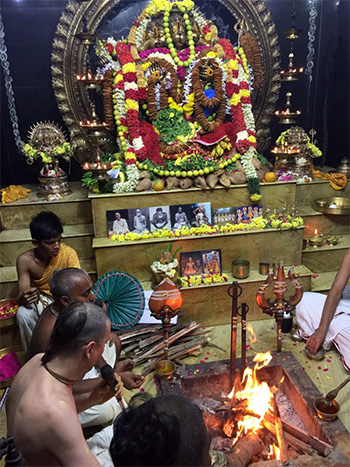Question: What types of sacrifices can one perform for the Lord? Please explain the procedures elaborately. Also explain whether the meaning of sacrifice is doing daanam to the poor people, or does it refer only to offerings made to God such as archanas, pujas, etc.?
There are various types of sacrifice (yajna or yagam) mentioned in the Bhagavad Gita:
dravya-yajnas tapo-yajna
yoga-yajnas tathapare
svadhyaya-jnana-yajnas ca
yatayah samsita-vratah
“Having accepted strict vows, some become enlightened by sacrificing their possessions (dravya-yajna), and others by performing severe austerities (tapo-yajna), by practicing the yoga of eightfold mysticism (yoga-yajna), or by studying the Vedas to advance in transcendental knowledge (svadhyaya-yajna and jnana-yajna).”
Dravya-yajna is sacrificing one’s possessions for a spiritual goal. In this sacrifice one must always take into account the proper circumstances for charity. As described in the Gita, charity falls within three modes of nature. If one gives charity to an unworthy person, such charity is in the mode of ignorance, and it will create negative effects. For example, I may give 5 rupees to a beggar in front of a temple, and he will use the money to buy cigarettes. This is charity in the mode of ignorance. By assisting him in his sinful activity I am receiving a share of the sinful reactions. We must only perform charity in the mode of goodness, otherwise it will just increase our bondage. To feed the poor with spiritual sanctified food is in the mode of goodness. But to feed the poor with ordinary food is generally in the mode of passion (rajo-guna). The best charity is the distribution of the sacred book Bhagavad Gita. In this also one must find a suitable recipient, someone who will respect and utilize the spiritual teachings.
Tapo-yajna is the sacrifice of austerity.
Yoga-yajna is the sacrifice of meditation. The best form of this meditation is the peaceful chanting of the Hare Krishna mantra. By meditating on the sound of Sri Hari’s name one will attain the state of samadhi.
Svadhyaya-yajna is the sacrifice of personally studying the Vedic scriptures such as Bhagavad Gita. While studying we must try to apply the acquired knowledge in our daily life. Otherwise such study is not a sacrifice.
Jnana-yajna is the sacrifice of cultivating spiritual knowledge of the self. We must try to understand that we are not the external body, but are in reality the eternal spirit soul within. One day our bodies will die, but we will live on. We must prepare ourselves for this transformation.
We should try to engage in these various types of sacrifice to the best of our ability. In one’s home, one should offer one’s food to the Lord. One should also perform personal puja to the Lord. The pujas in the temples are secondary. If one is not personally worshipping the Lord, the archanas in the temples will not have any effect on one’s consciousness. It is just a ritual where one pays 10 rupees, and a hired man recites mantras. There must be personal devotion and sacrifice. Only then the Lord will take notice. All types of sacrifice should ultimately culminate in devotion to the Lord.
Receive our daily email newsletter on Hinduism, Yoga, Meditation, Ayurveda and Natural Healing.






